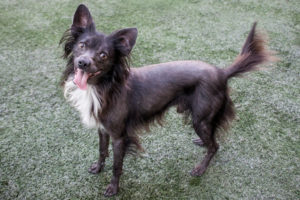
PET OF THE WEEK: Phil From The Future is a year-old Chinese Crested/terrier mix. He definitely has a unique hairdo, a combo of luxurious black and white fur and short fuzz, but he makes it look good! He’s an active and playful dog who has proven to be great on a leash. He’s hoping to find a home with teens or adults. Ask for Phil from the Future, ID# A825638. Adoptable pets are available at Peninsula Humane Society & SPCA’s Tom and Annette Lantos Center for Compassion, 1450 Rollins Road, Burlingame. For information, call 650-340-7022 or visit www.phs-spca.org. (Thelma Andree / Peninsula Humane Society and SPCA)
Dear Miss Behavin’: My dog plays great with other dogs off-leash, but barks like crazy on-leash whenever she sees a dog. I’m so confused, why would she have this dual personality?
Reply: What you’re describing is very common. Since we can’t read their minds, no one can say definitively why some dogs would be great off-leash but bark on-leash, but there are some promising theories. This problem can be more prevalent in high-density city or suburban areas, where dogs are expected to live in close proximity to other canines.
First, it’s important to realize that every dog is an individual, and the reason for barking on leash may vary from dog to dog. For example, some owners might think their dog loves to play off-leash with other dogs, but the dog might actually be nervous or afraid. A fearful dog might bark at other dogs while on leash to say “go away.”
If a dog is truly social with other dogs off-leash, she could bark on-leash out of frustration. Basically, she is so excited to see the other dog she is desperate to meet it and starts barking since she can’t. Over time this frustration can build and that barking can worsen. In general, the longer your dog has been practicing this behavior, the longer it will take to train away.
If your dog is barking out of frustration, that doesn’t mean you should allow her to meet the other dog on leash. First, the other owner might not want you to approach, and second, you don’t want to inadvertently reward your dog for the barking.
It’s much better to teach your dog to politely focus on you until the other dog passes by. To do this, carry dog treats with you to use as a distraction whenever another dog is nearby. Use treats your dog would not normally get at home, such as chopped-up hot dog or chicken. Eventually your dog will anticipate a treat whenever she spots another dog, which means she will start automatically looking to you for her tasty tidbit, instead of barking.
